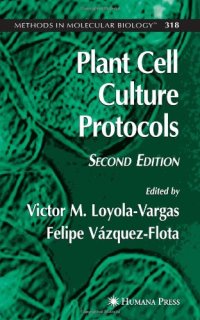
Ebook: Plant Cell Culture Protocols
- Tags: Plant Sciences
- Series: Methods in Molecular Biology 318
- Year: 2006
- Publisher: Humana Press
- Edition: 1
- Language: English
- pdf
Following in the footsteps of its much-acclaimed first edition, Plant Cell Culture Protocols, Second Edition has been expanded and revised to include the most up-to-date and frequently used techniques for plant cell and tissue culture. Readily reproducible and extensively annotated, the methods range from general methodologies, such as culture induction, growth and viability evaluation, and contamination control, to such highly specialized techniques as chloroplast transformation involving the laborious process of protoplast isolation and culture. Most of the protocols are currently used in the research programs of the authors or represent important parts of business projects aimed at the generation of improved plant materials. The protocols follow the successful Methods in Molecular Biology™ series format, each offering step-by-step laboratory instructions, an introduction outlining the principles behind the technique, lists of the necessary equipment and reagents, and tips on troubleshooting and avoiding known pitfalls. Two new appendices have also been added to explain the principles for formulating culture media and the composition of the eight most commonly used media formulations, as well as to list more than 100 very useful internet sites.
Comprehensive and highly practical, Plant Cell Culture Protocols, Second Edition offers today's plant biotechnologists indispensable state-of-the-art techniques for carrying out plant research, for developing new transgenic plants, and for today's many and diverse commercial applications.
A comprehensive state-of-the-art collection of the most frequently used techniques for plant cell and tissue culture. Readily reproducible and extensively annotated, the methods range from general methodologies, such as culture induction, growth and viability evaluation, and contamination control, to such highly specialized techniques as chloroplast transformation involving the laborious process of protoplast isolation and culture. Most of the protocols are currently used in the research programs of the authors or represent important parts of business projects aimed at the generation of improved plant materials. Two new appendices explain the principles for formulating culture media and the composition of the eight most commonly used media formulations, and list more than 100 very useful internet sites.